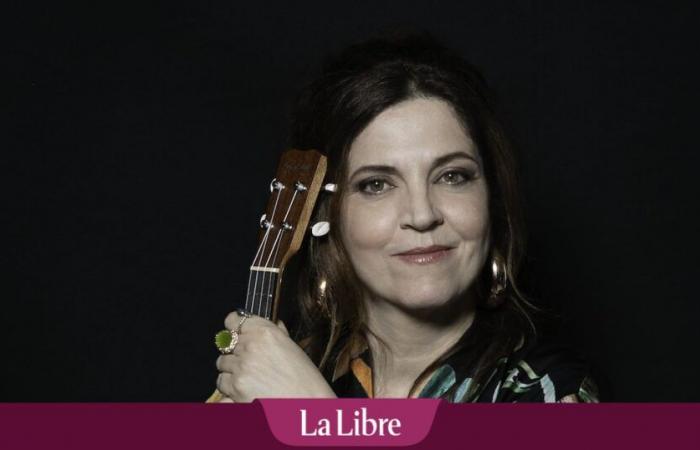
Reading the childhood life of Agnès Jaoui, we have the impression of better understanding her work as an author. The pieces that we loved by her, her films, this tone, too, which is hers, assertive and singing at the same time on the phone, while we interview her. We are in the primary school playground with her, and we are trying to avoid the taunts. We cross, at full speed with her, the Jardin des Plantes, because we are afraid of exhibitionists. She takes us to the kibbutz of her childhood summers, but we feel that, by telling us what she experiences there, she is almost afraid of hurting us. Among a thousand sweet memories that shaped her, Agnès Jaoui tells us about an abuse. The one she was a victim of.
What was the need or urgency for you to write this book?
There are several circumstances. In the disorder, the fact that Jean-Pierre [Bacri NdlR] not being there anymore, I didn’t know if I was going to succeed in writing another film, if I even had the desire to do so. I didn’t know who else to write with. The other reason is that I wanted to do something with my childhood friend and artist that I admire, Cécile Partouche. This was always the case with Jean-Pierre: the work takes so much time, when you can do it with friends, loves, it is all the more wonderful. Finally, time passed and I found pleasure in remembering.
We will read the review of “The size of our breasts”, by our colleague Jacques Besnard.
When you read this book, you realize that you keep a journal. Have you ever used the contents of your diary to write plays or films?
What is curious is that this book stops at the age when my diary begins. the book goes from when I was 7 to when I was 11 and I wrote my diary from when I was 11. I don’t use my diary to write, it’s never worked like that. It’s there, nearby, and I write down what I need to write down, out of the need to leave a trace and reflect on what’s happening to me.
We start with the end of The size of our breasts : you write this sentence, in which you talk about this obsession with your budding breasts.” And while I don’t really know how to finish this book, I tell myself that it is perhaps not a coincidence that my first text without it [Jean-Pierre Bacri, NdlR] bears on her”. Until then, had it been impossible to write about this entry into the adult world which had been far too violent for the little girl that you were?
Yes, and it remains complicated. I was wondering about this, yesterday, in my diary, about the immodesty of these confessions, of all these women who say, in this rather dizzying period that we are going through, who have a need to say it, [L’abus, NdlR]. What does this involve? As for me, I didn’t want to talk about it. I still don’t want to talk about it, but when I hear things about control, abuse, I want to give my point of view. Do you know that there are women who will file a complaint at the age of 80, knowing that there will be no more trials? But they want to testify.
In any case, I had no desire for sensationalism, first of all because something is happening to me that happens to countless women, and young boys too for that matter… But there you go, I’m not completely clear with all that.
You write, about your departure for Paris, when you were 7 years old: “I was crying, probably because I never left anything“. Are you the sentimental type?
So there, completely. First of all, among the Jaouis, we cry a lot: my father cries, my grandfather cried, my aunt Nadine cries: we cry easily. I think it’s very good to cry, it’s a chance to be able to cry, there is this book by Irvin Yalom, remarkable, Nietzsche cried, I recommend it to everyone. People who don’t have access to their tears must suffer a lot, it’s not good to keep them. But anyway, well, there are degrees all the same, and we are part of the “lacrimals”, well the lachrymals, I mean…
“Always this need, do you writeto create castes and hierarchies, and still need to believe in it“. A sentence which inspires an ingenuous question in me: you who now belong to the caste of “successful people”, what is happening in this caste? And, as a famous person, have you the right to ask everything?
(Gbig laughs) There are privileges and, moreover, we can clearly see that, in the hunt for stars that there is at the moment, there is this hatred of the privileges that fame grants you. Even if, at the same time, everyone would like to be part of it, especially with social networks, because if I understood correctly, they allow access to it… I say that because I am regularly told: “but you don’t know that she is really famous” and I must admit that no, I don’t know that she is famous.
In short, there is a reality: sometimes you get a restaurant table more easily, but that doesn’t stop you from running into lots of people who don’t know you. It’s a funny contrast, because fame can give you the illusion, at times, of having some power, and then, most of the time, not at all.
“If I think about my childhood, I think my mother never made a major decision while she was with my father until she made one, which was to leave him.“. In this book, we have the impression that you are a little less verbose about your mother than about your father. Was your mother a feminist?
She was extremely feminist, especially from the moment she began to distance herself from my father. When I was 21, I started to become interested in books written by women, particularly Doris Lessing and her Golden Notebook. I have memories of my mother consulting it: she read it like the Bible. So I was happy to read it, too, once I reached adulthood. In his copy, passages are underlined and, in the margin, “Hubert !!!“, with exclamation points – which is none other than my father’s first name – when it came to describing masculine behavior. There was a hatred of men, and not one, either, to make up for it. the other!
Of course, I was already a feminist. I wanted to exist on my own, basically, I wanted to open it up…, but I didn’t agree at all with this vision of men […] I still am not.
Agnès Jaoui: “I think there are crazy people who are downright President of the Republic”
You tell this anecdote where, when you were very young, your parents made fun of you because you liked “Monday in the Sun” by Claude François. You add: “it is the one who criticizes first, who dominates. And refining one’s taste for a despised art requires great courage and solid self-confidence.“. When you write this sentence, it echoes what you wanted to propose in The taste of others(in 2000, Editor’s note) this film which, at the time, had been a hell of an attack against what is supposedly beautiful or ugly?
Of course ! And I continue to observe the fashions and the disgusts with as much criticism and smiles, because well, it’s not so serious… Well, it’s not serious when we don’t erase people, of course . But look, when you study art history, it’s unbearable to see how women artists are relegated to I don’t know where. For what ? Because there are no women artists? Because it’s written by men! But not only that, there are women who have internalized misogyny.
Edith Wharton, we reconsider her today, but there is always someone who says: “Henry James said she was this or that“. talent must pass through the prism of a great writer who praises it? Really? But who decides that Berthe Morisot is less good than Edouard Manet?
I have just finished a film by Sophie Filière, My life, my face, and I was surprised to discover that it had never been selected at Cannes even though it is highly esteemed in the world of cinema. At the time, who decided that Benoît Jacquot was a greater filmmaker than Sophie Filière? Well, here I come back to the genre, but it can be outside the genre. There are always people who like to decide that, yes, “it’s great music” or “great cuisine“. And when we start to say, “it’s not good“, you feel a bit stupid if you like yourself, because the criticism is stronger!
In your works, do you seek to leave a lesson, a moral or a method?
It’s more a point of view that I need to express or a moral, in the sense of the fable. What I like above all is what you have just described, and which makes me very happy, on The taste of othersit’s a film that makes you question yourself, because we all tend to know how to criticize very well, and have less of this perspective on ourselves. That’s what interests me. Let us come away from the film or the reading saying to ourselves: Maybe I was wrong“.
Would you say that you are a “solutionist”?
The solutions, first of all, there is not just one! I like to try, as long as I have faith, to be constructive, but I seek to give models of resilience, where, in our films, and in the next one that I have just written, I try to ‘imagine characters who remain upright in the storm of compromises, who manage to question themselves, or who realize that they have been with the pack, that they have not thought for themselves .
gull“Now, I’m going to hang up with you, and go see my therapist. I found remedies for melancholy, but no, this book didn’t soothe me.”
Has this book allowed you to tame these inner fears that you tell us about? Did you put them in a box?
No, they are there, I work on them, every day. There, I’m going to hang up with you, and go see my therapist. I found remedies for melancholy, but no, this book did not soothe me even though it was quite pleasant to write. There was some form of evidence. I loved that moment.
⇒ “The size of our breasts | Agnès Jaoui, illustrations by Cécile Partouche | Grasset, 144 pp., €19, digital €14





